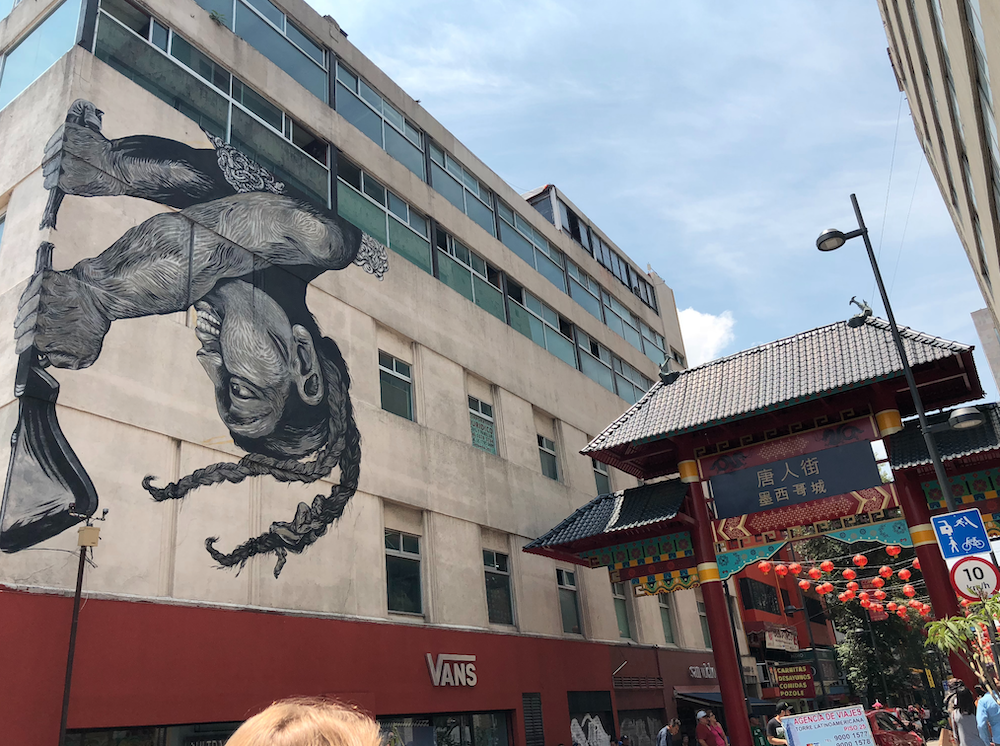In the ancient Chinese game of Go, players gradually place black and white pieces on a wooden board, competing for strategic positioning. If China and the U.S. have recently been locked in something of a Go match over influence in Latin America, China is firmly setting a new piece —on Mexico. President Andrés Manuel López Obrador, or AMLO, is seemingly receptive to the idea of stronger ties with China, so President Joe Biden and his administration would be wise to consider their next move.
A significant increase in Chinese influence over Mexico would have strong implications for U.S. security. Washington has, until now, maintained a “special relationship” with its southern neighbor in terms of security cooperation. Though the Mexican government has enjoyed autonomy in managing public order, it has kept the U.S. as its main — and practically its only — partner in domestic security matters. The development of a strong Mexican-Chinese relationship could change this equation, with Beijing emerging as an alternative source of equipment and advising to aid in Mexico’s escalating drug war.
Mexico, until now, remained something of an outlier in Chinese influence over Latin America. Trade between the People’s Republic of China (PRC) and the region soared over the last two decades — from $17 billion to $315 billion between 2002 and 2019 — while Chinese investment reached $143.2 billion over the last decade. But less than 2% of that went to Mexico, while China took in just 1.6% of Mexican exports in 2019. Limited economic ties have meant weak political relations between the two countries, and while Chinese and Mexican leaders have exchanged visits only periodically, diplomatic dialogue had lagged behind that of other Latin American countries.
But the era of stunted engagement may soon be coming to an end. When Mexico’s Secretary of Foreign Affairs Marcelo Ebrard thanked Beijing for its support in confronting the COVID-19 pandemic — support that included a supply of 35 million doses of the Chinese CanSino vaccine in the coming months — he added that Mexico “will expand the strategic partnership of both nations.” The statement, preceded by Ebrard’s July 2019 visit to Beijing, was the latest in a series of pro-PRC gestures made by the AMLO administration.
Two key factors have, until recently, deterred Mexico from engaging more closely with China. First is the U.S.’s unprecedented political and economic influence since NAFTA was signed in 1994. Second is nationalism. A legacy of a bloody war of independence as well as a number of subsequent French and U.S. interventions, Mexican political elites have historically opposed foreign interference. While U.S. and Mexico have developed an uneasy partnership as a result of the intense human, cultural and economic exchange between the two countries, relations with distant China have remained alien. Mexican authorities have, therefore, until now preferred the devil they know.
These barriers to engagement have begun to erode. After years of commercial and political friction between Mexico and the administration of Donald Trump, Joe Biden’s government may, rather than lead to an automatic improvement in bilateral ties, bring new tensions.
In the area of security, conflict is almost certain. AMLO will likely be reluctant to accept criticism of his handling of the fight against organized crime and corruption, particularly since the Trump administration agreed to drop a set of money laundering charges against former Mexican Secretary of Defense General Salvador Cienfuegos. The general was allowed to leave the U.S. in exchange for a mere promise that Mexican authorities continue investigations, a promise broken 58 days later when Mexico decided to not prosecute. In another demonstration of AMLO’s nationalistic credo, Mexico’s Congress also recently passed a law restricting the work of U.S. Drug Enforcement Agency (DEA) agents on Mexican soil, dealing a serious blow to security cooperation just as drug cartels expand their influence.
Cognizant of the emerging opportunity, the PRC has been quick to step in with visible shows of support. In addition to sending medical equipment and vaccines during the pandemic, China is also involved in some of AMLO’s most emblematic projects under the umbrella of his “Fourth Transformation” (4T) anti-poverty and anti-corruption push. A consortium led by the China Communications Construction Company (CCCC) and the Portuguese company Mota-Engil won the contract to build the first section of the Maya Train (Tren Maya), securing a key foothold in AMLO’s strategy to boost economic development in southern Mexico. Closely tied to the president’s public image, profits from this Army-managed project will also be used to fund the military pension system, making it even more important politically.
Chinese investments have also become particularly relevant in the oil sector. In 2014, the PRC achieved an agreement to create the Energy Fund SINOMEX with the participation of the Mexican state oil company PEMEX, the China National Petroleum Corporation, the China Development Bank and the Industrial and Commercial Bank of China. This mechanism has provided a $600 million loan to finance the construction of the Dos Bocas Refinery, a project considered financially unworkable by the majority of the experts, but key for AMLO’s attempt to reduce imports of refined petroleum products and assert Mexican energy independence. Once again, Chinese authorities have put politics over profitability, supporting an economically dubious initiative to win the sympathy of its Mexican counterparts.
Though it was former President Enrique Peña Nieto who relaunched the bilateral relationship between Mexico and China, giving it “strategic partnership” status during a 2013 visit from Xi Jinping, AMLO may hold a more ideological view. China could become a key ally for the transformation of his country following the nationalistic and statist ideas of the Mexican Revolution which were initially embodied in the Institutional Revolutionary Party (PRI), the dominant political force in the country till the early 2000s. AMLO has presented himself as the popular champion for the recovery of this legacy which, in his view, was betrayed by previous Mexican presidents who implemented market-oriented reforms and developed a close cooperation with Washington. His political project, which defends policies of social handouts to popular sectors, gives the state a central role in economic development and rejects U.S. influence, will be able to count on sympathy from Beijing.
Though relations between the U.S. and Mexico may not alter dramatically in the short-term, the former should expect China to expand its presence in key sectors of the Mexican economy as well as strengthen political cooperation moving forward. Should AMLO’s strategy of approximation bear fruit domestically, it could embolden anti-U.S. sectors of the Mexican government, creating an additional source of friction with Washington. As Biden officials begin defining foreign policy priorities in Latin America, they should be careful not to take Mexico for granted as a perpetual exception to Chinese influence.


